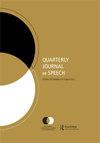民主情节剧和专制情节剧
IF 1.3
2区 文学
Q2 COMMUNICATION
引用次数: 0
摘要
本文区分了民主主义情节剧和专制主义情节剧。我们认为,这两种形式的情节剧之间的区别不仅仅在于 "观察者的眼睛",而是...本文章由计算机程序翻译,如有差异,请以英文原文为准。
Democratic melodrama and authoritarian melodrama
This essay distinguishes democratic melodrama from authoritarian melodrama. We argue that the distinction between the two forms of melodrama is not merely located in the “eye of the beholder,” but ...
求助全文
通过发布文献求助,成功后即可免费获取论文全文。
去求助
来源期刊

Quarterly Journal of Speech
COMMUNICATION-
CiteScore
1.80
自引率
36.40%
发文量
39
期刊介绍:
The Quarterly Journal of Speech (QJS) publishes articles and book reviews of interest to those who take a rhetorical perspective on the texts, discourses, and cultural practices by which public beliefs and identities are constituted, empowered, and enacted. Rhetorical scholarship now cuts across many different intellectual, disciplinary, and political vectors, and QJS seeks to honor and address the interanimating effects of such differences. No single project, whether modern or postmodern in its orientation, or local, national, or global in its scope, can suffice as the sole locus of rhetorical practice, knowledge and understanding.
 求助内容:
求助内容: 应助结果提醒方式:
应助结果提醒方式:


